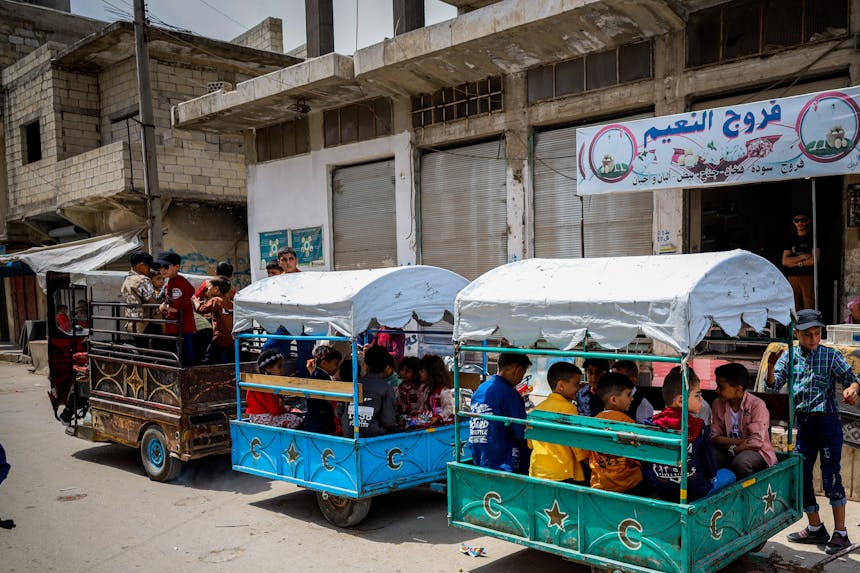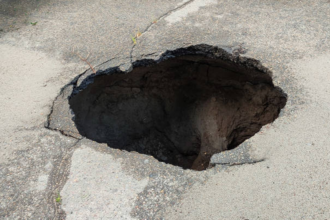Idlib, a remote region in northwest Syria, bears the marks of decades of war—trenches, abandoned military positions, and remnants of rocket shells. However, this area is now the only part of Syria controlled by opposition forces. Rebel groups, led by the Islamist faction Hayat Tahrir al-Sham (HTS), have taken charge here since 2017, bringing some semblance of stability after years of civil conflict.
Syria in Turmoil: Who is Responsible for the Latest Violence?
Until just over a week ago, this region was at the heart of a remarkable offensive that helped overthrow Bashar al-Assad’s regime, marking the end of his family’s decades-long rule. As HTS assumes control, it appears poised to export its governance model to the rest of Syria.
Visible Improvements Amid Old Wounds
In Idlib’s city center, the opposition flags fly high, symbolizing the victory over Assad’s forces. The streets, once ravaged by conflict, now show signs of recovery. Graffiti celebrating the resistance covers walls, while shops are reopening and roads are being maintained. However, despite these visible improvements, many residents feel the burden of HTS’s strict rule.
When we visited earlier this week, the streets were relatively clean, traffic lights worked, and officers patrolled busy areas—small yet significant signs of order that were once missing from the rest of Syria. These are sources of pride for locals who feel a sense of normalcy returning, even in the wake of past devastation.
A Complex Leadership with a Jihadist Past
HTS, which traces its origins to al-Qaeda, has made efforts to distance itself from its extremist past. Over the years, it has rebranded as a nationalist force, presenting itself as the antidote to Assad’s dictatorship. Yet, it remains designated as a terrorist group by the US, the UK, the UN, and others, including Turkey, which supports some of the opposition.
Since seizing control of Idlib in 2017, HTS has established its governance structures. The Salvation Government now manages essential services like water distribution, electricity, garbage collection, and road maintenance. Revenue from taxes levied on businesses, farmers, and cross-border trade with Turkey funds both public services and military operations.
Dr. Hamza Almoraweh, a cardiologist who relocated to Idlib in 2015, describes the region’s transformation since HTS took control. “We’ve seen a lot of development here. Idlib has a lot of things it didn’t have under the Assad regime,” he says, citing improvements in infrastructure and public services.
Gradual Shifts in Social Policies and Governance
As HTS seeks international legitimacy, it has toned down some of its earlier hardline policies, including strict dress codes for women and bans on music in schools. Locals have noted that a degree of criticism is now tolerated, a stark contrast to the stifling repression of the Assad regime.
“It’s not a full democracy, but there’s freedom,” says activist Fuad Sayedissa, who returned to Idlib for the first time in a decade following Assad’s ouster. Sayedissa, who now lives in Turkey and runs an NGO, suggests that while HTS has changed in recent years, concerns about its future governance remain.
Authoritarianism Lingers Despite Reforms
Despite these steps toward moderation, protests have erupted over issues such as taxes, which some view as unfair. Experts point out that HTS’s consolidation of power has involved targeting extremists, absorbing rival groups, and imprisoning opponents. Many Syrians are wary of what comes next, fearing that the group may evolve into a dictatorship, much like the regime it replaced.
“The people are still celebrating, but they’re also worried about the future,” Sayedissa explains. “How the government will act in the whole Syria is a different story.”
Minority Concerns Amid Change
One hour from Idlib, in the Christian village of Quniyah, church bells rang for the first time in a decade on 8 December to mark Assad’s removal. The community, devastated by bombings during the civil war, is slowly rebuilding, but fears persist among minority groups. HTS has reassured religious and ethnic minorities, but many are cautious.
Friar Fadi Azar, a Christian leader in Quniyah, says the Islamist group has granted his community more freedom in recent years, allowing Christians to reclaim land and property once lost to the war. “They gave [our community] more freedom,” Azar says, although he remains uncertain about the group’s long-term intentions. “What can we do? We have no other option. We trust them.”
A New Syria or a Return to Dictatorship?
While HTS has succeeded in gaining local support by restoring some stability and offering a certain degree of freedom, the future remains uncertain. Even those who initially supported the group are wary of its potential to turn authoritarian. “They’re now the heroes,” Sayedissa says, “But we have red lines. We’ll not allow dictators again.”
As Syria braces for the next phase in its turbulent history, the lessons of Idlib may provide a glimpse into what the rest of the country could face under rebel rule. The region’s complex mix of authoritarian governance, moderate reforms, and fragile stability highlights the difficult road ahead for Syria’s future.








